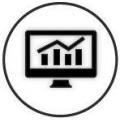This five part, interactive workshop series is your complete introduction to the capabilities of the Python language.
Sign up for our weekly newsletter!
This is an archive of our past training offerings. We are looking to include workshops on topics not yet covered here. Is there something not currently on the list? Send us a proposal.
The R for Data Science workshop series is a four part course, designed to take novices in the R language for statistical computing and produce programmers who are competent in finding, displaying, analyzing, and publishing data in R.
Day 4 (functions and packages)
This five part, interactive workshop series is your complete introduction to the capabili
The R for Data Science workshop series is a four part course, designed to take novices in the R language for statistical computing and produce programmers who are competent in finding, displaying, analyzing, and publishing data in R.
Day 3 (analyzing data)
This five part, interactive workshop series is your complete introduction to the capabilities of the Python language.
The R for Data Science workshop series is a four part course, designed to take novices in the R language for statistical computing and produce programmers who are competent in finding, displaying, analyzing, and publishing data in R.
Day 2 (clean and tidy data)
This intensive is a 3-day presentation of the D-Lab’s 3-part introductory Stata workshop series. The intensive will cover the following materials:
Part I: Introduction (May 17)
This five part, interactive workshop series is your complete introduction to the capabilities of the Python language.
The R for Data Science workshop series is a four part course, designed to take novices in the R language for statistical computing and produce programmers who are competent in finding, displaying, analyzing, and publishing data in R.
Day 1 (basics of R)
This five part, interactive workshop series is your complete introduction to the capabilities of the Python language.
An intro to the basics that instructors often assume you know, but that you probably never had good instruction on! After this course, you should be able to more easily start learning to program (e.g., in R or python), follow instructions and documentation online (e.g. StackExchange), and communicate better with your collaborators who are programming. This interactive workshop will cover:
This workshop will introduce geocoding - the process of determining the geographic coordinates for place names, zip codes or addresses. The first part of this workshop will be an introduction to the process of geocoding and strategies for achieving good results. This process will be demonstrated using the R ggmap package, which calls the Google Geocoding service.
This workshop covers how to organize and analyze qualitative data in Dedoose. Both researchers new to qualitative methods and experienced qualitative researchers are encouraged to attend.
This course introduces students to modern quantitative text analysis techniques, with the ultimate goal of providing the skills necessary to apply the methods in their own research. We will use the open source programming language R. Demonstration corpora are provided.
Topics Covered
This workshop will introduce methods and libraries for mapping spatial data in R.
Students will be introduced to the basics of clustering using R. They will learn the basics of distance matrices and linkage methods, transforming data, creating cluster objects, and the construction, manipulation, and interpretation of dendrograms. They will also learn how to compute cluster p-values via multiscale bootstrap resampling from the 'pvclust' package.
This is the third workshop in a 3-part Stata series offered at the D-Lab that includes: 1) Intro to Stata, 2) Data Analysis in Stata and 3) Stata Programming.
The D-Lab is proud to present our new brown bag series, "How We Did It", a bi-weekly, hour-long presentation on specific topics from quantitative data cleaning to best practices for entering the field for participant observation. Each brown bag will feature a short presentation/demonstration on techniques followed by an informal question and answer/comment session.
This seminar will be presented by Guillermo Douglass-Jaimes.
There is a wealth of publicly available genomic data out there in the form of microarray and RNA-Seq datasets. This workshop will introduce you to the rich ecosystem of genomic data repositories and analysis tools available for discovery and utilization of open genomic data. We will focus on a handful of bioinformatics tools that are accessible to researchers without programming expertise.






